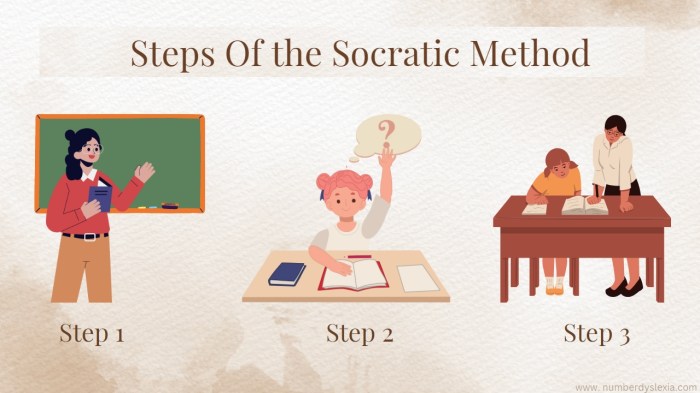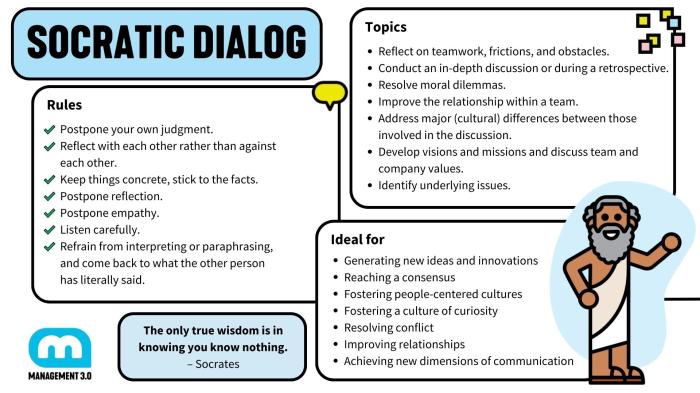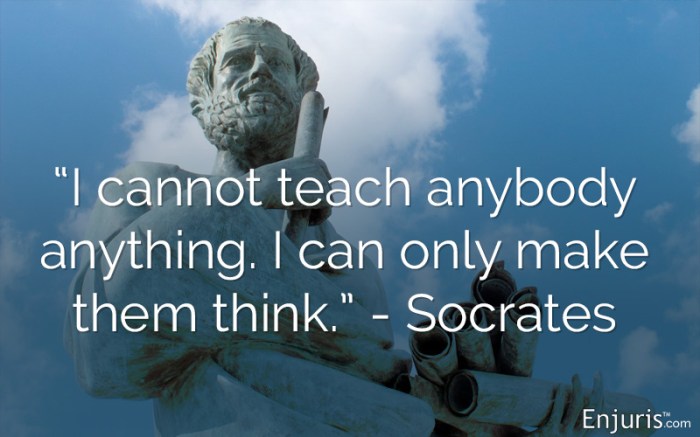Which Best Illustrates the Socratic Method? takes center stage as an exploration into the depths of a pedagogical approach that has shaped critical thinking and intellectual discourse for centuries. This discourse delves into the Socratic Method’s essence, its fundamental elements, and its enduring relevance in contemporary society.
The Socratic Method, attributed to the renowned Greek philosopher Socrates, is a powerful tool for fostering critical thinking, intellectual curiosity, and a lifelong pursuit of knowledge. By engaging in a series of probing questions and logical reasoning, the Socratic Method challenges individuals to examine their beliefs, assumptions, and values, leading to a deeper understanding of complex issues.
1. Socratic Method
Definition and Overview

The Socratic Method is a philosophical inquiry technique attributed to the Greek philosopher Socrates. It involves a series of questions and responses designed to critically examine a topic and uncover the truth.
Origins
The Socratic Method originated in ancient Athens, Greece, where Socrates engaged in philosophical discussions with his students and contemporaries. Socrates believed that true knowledge comes from within and can be revealed through questioning and self-examination.
Famous Socratic Dialogues
- Apology: Socrates’ defense speech against charges of impiety and corrupting the youth.
- Crito: Socrates’ discussion on the nature of justice and the importance of following the law.
- Phaedo: Socrates’ final conversation with his students before his execution, focusing on the immortality of the soul.
2. Key Elements of the Socratic Method

Questioning and Inquiry
The Socratic Method relies heavily on questioning and inquiry. Socrates used a series of questions to challenge assumptions, explore different perspectives, and uncover the truth.
Logical Reasoning and Critical Thinking
The Socratic Method encourages the use of logical reasoning and critical thinking to evaluate arguments and conclusions. Socrates believed that sound reasoning is essential for understanding the world and making informed decisions.
Self-Examination and Intellectual Humility
The Socratic Method emphasizes the importance of self-examination and intellectual humility. Socrates believed that true knowledge comes from recognizing one’s own ignorance and being willing to learn from others.
3. Benefits of the Socratic Method
Critical Thinking Skills
The Socratic Method fosters critical thinking skills by encouraging individuals to question assumptions, analyze arguments, and evaluate evidence.
Intellectual Curiosity and Thirst for Knowledge
The Socratic Method promotes intellectual curiosity and a thirst for knowledge by stimulating inquiry and encouraging the exploration of new ideas.
Sound Judgment and Decision-Making Abilities, Which best illustrates the socratic method
The Socratic Method can help individuals develop sound judgment and decision-making abilities by teaching them to critically evaluate information and make informed choices.
4. Limitations and Challenges of the Socratic Method: Which Best Illustrates The Socratic Method

Reliance on Verbal Communication
The Socratic Method relies heavily on verbal communication, which can be a limitation in certain contexts or for individuals who struggle with verbal expression.
Challenging for Certain Individuals or Contexts
The Socratic Method can be challenging for certain individuals, such as those who are not comfortable with questioning authority or who have difficulty with abstract thinking.
Strategies for Overcoming Challenges
- Encourage non-verbal participation, such as writing or drawing.
- Use Socratic questioning in a supportive and non-judgmental environment.
- Adapt the Socratic Method to fit the needs of the individuals and context.
5. Modern Applications of the Socratic Method

Education
The Socratic Method is widely used in education to promote critical thinking and intellectual curiosity. It encourages students to engage in active learning and question the status quo.
Philosophy
The Socratic Method remains a fundamental tool in philosophical inquiry. It is used to examine ethical dilemmas, explore the nature of reality, and challenge conventional wisdom.
Other Fields
The Socratic Method has also found applications in other fields, such as law, business, and counseling. It can help individuals develop problem-solving skills, negotiate effectively, and facilitate productive conversations.
FAQ Corner
What is the primary goal of the Socratic Method?
The primary goal of the Socratic Method is to stimulate critical thinking, encourage intellectual curiosity, and promote a deeper understanding of complex issues through questioning, logical reasoning, and self-examination.
How does the Socratic Method foster critical thinking skills?
The Socratic Method challenges individuals to question their assumptions, examine evidence, and evaluate arguments logically. This process helps develop critical thinking skills, enabling individuals to analyze information objectively and make sound judgments.
What are some limitations of the Socratic Method?
One limitation of the Socratic Method is its reliance on verbal communication, which can be challenging for individuals with certain learning styles or in specific contexts. Additionally, it can be time-consuming and may not be suitable for all learning objectives.
